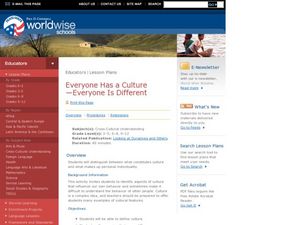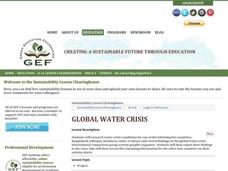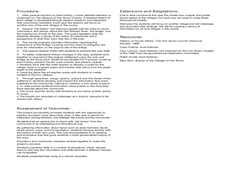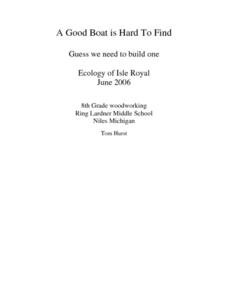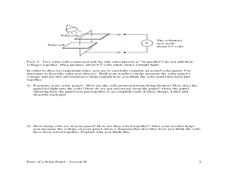Curated OER
CULTURES OF OUR NATION
Students explore their own culture and the culture of their classmates.
Curated OER
Fun Along the Way: Technology and the Teaching of World Languages
Learners record themselves saying basic biographical facts about themselves: : what their names are, where they live, how old they are, what languages they speak, and what activities they like to do. They practice their presentational...
Curated OER
Germs and Your Body
Students study germs and ways your body fights against disease. In this germs lesson students complete an activity that demonstrates where germs can get into your body.
Curated OER
Today's Specials
In this healthy heart nutrition worksheet, students substitute heart-healthy foods for the high cholesterol choices shown. The purpose is to encourage nutritious choices.
Curated OER
Everyone has a Culture-Everyone is Different
Learners explore cultural features. In this multicultural acceptance instructional activity, students define and discuss "culture," and distinguish the difference between individual characteristics and cultural characteristics. ...
Curated OER
Character Traits - Who are We?
Sixth graders examine character traits. In this character education lesson plan, 6th graders set goals to strengthen particular personal character traits. Students watch their instructor model the character trait journaling strategy...
Curated OER
Global Water Crisis
Assign ecologists one of five countries that struggle with access to clean water. They research the water crisis in that country and then present information to classmates. A handout was designed for each country, and a worksheet on...
Curated OER
Mixing It Up!
Third graders identify the different states of matter. For this science lesson, 3rd graders describe the different components of solutions and mixtures. They create emulsions, foams and suspensions in the lab.
Curated OER
Take the Lead — Get the Lead Out
Young scholars research about the physiological effects of prolonged lead exposure. In this chemistry lesson, students investigate the lead content of different paint, soil and water samples. They analyze data trends and share their...
Curated OER
Sense of Place: No River Too Wide-Bridges
Fifth graders discover the history of their hometown Des Moines River. In this U.S. Geography lesson students speak with Iowans that tell stories of the settlers and early villages near the Des Moines River. Students document their...
Curated OER
Respect for Authority
Students examine the country of Mongolia and how it is trying to form a democracy. As a class, they participate in a class meeting about a new class rule and they voice their opinions. They read excerpts of a letter of a Peace Corps...
Curated OER
The Constitution.
Second graders study the Constitution. They examine the meaning and fundamentals of the Preamble of The Constitution of USA. They assess the importance of having a Supreme Law that states the rights and obligations of the citizens. They...
Curated OER
Junior Architects of America
Learners create entries for the Architects of America contest, including a model of a futuristic structure, blueprints, a list of all plane and solid shapes in the structure, a persuasive argument paper that describes why the structure...
Curated OER
President Obama's Address to Students Across America
Learners listen to President Obama's speech, and discuss its meaning. In this President Obama activity students learn about the president, about how to deliver a speech, and the ways they can make a difference. They create posters, write...
Curated OER
Art and Anatomy: The Vitruvian Teen
Twelfth graders create an artistic version of a Vetruvian teen. In this anatomy lesson, 12th graders design an experiment to test the theory of the ideally proportioned man. They present their findings in class.
Curated OER
Jobs I Can Do: Electronic Portfolio
Twelfth graders investigate the concept of discovering jobs and how to adapt to life even with a disability. They take part in field experiences and take pictures using a digital camera while creating an electronic portfolio of possible...
Curated OER
A Good Boat is Hard To Find
Eighth graders design and construct a safe and efficient human powered watercraft that can be used on a trip on the Great Lakes. Students utilize math and measurement skills to design and cut the pieces for their boat. Working in...
Curated OER
The Family: Louisiana Family Folklore
Students determine that all families create and pass on folklore. They research stories of their own names and draw parallels between their own and others' naming traditions. They infer characteristics of their communities' history...
Curated OER
Communities
Students are introduced to the concept of communities. Using a map, they locate and describe different communities of all sizes. They watch a video and answer questions on a worksheet to complete the instructional activity.
Curated OER
Parts of a Solar Panel-Part II
Young scholars discover how a mini-solar panel is constructed by behaving like detectives. Students examine an actual solar panel, measure the solar panel's voltage and use drawings to describe what they observe before completing...
Curated OER
Machines: Designing Form and Function
Young scholars design a boat model with simplified steam engine. In this ecology lesson plan, students compare renewable and nonrenewable energy sources. They determine the efficiency of their boat model.
Curated OER
American Culture in a Musical Setting
Young scholars discover the significance of similarities and contrasts of three separate cultures of the United States through music. They take out maps and trace the expedition of the Spanish along the coasts of Mexico and North and...
Curated OER
Student Internship Program
Students research and identify their own internship opportunities. They keep a daily journal describing their experiences during their 30 hour volunteer internship programs
Curated OER
What's in a Willow?
Students study of nutritional value of edible native plants. discriminate between foods that have nutritional value and those that do not. They relate how food can affect how they think, feel, and perform.






